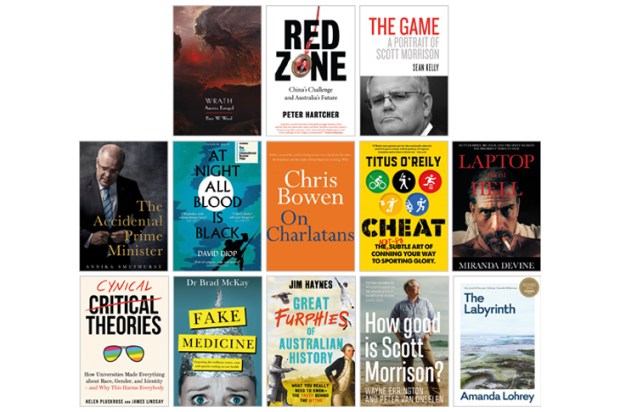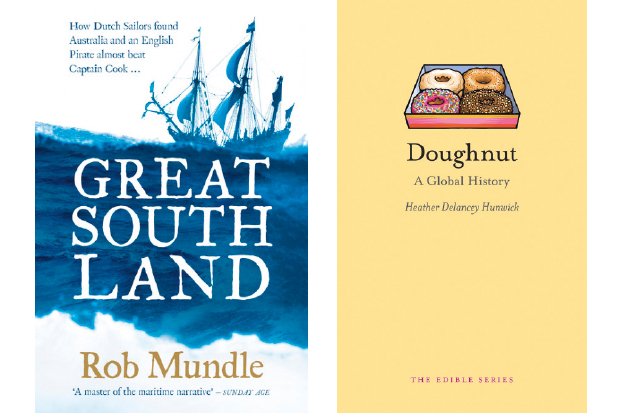In a year when we could all use a different perspective Jim Haynes came to the rescue with his latest sojourn into history, Heroes, Rebels and Radicals of Convict Australia (published by Allen & Unwin, rrp $35). In fourteen essays he covers a cast of colourful characters. John White was the surgeon and doctor of the colony, and his work saved countless lives. Mary Reibey, one of many remarkable women of the convict era, somehow made the transition from horse thief to a respected entrepreneur and investor. John Donohoe was an early bushranger but his myth was larger than the reality. Haynes has the knack of turning dry historical records into interesting stories, and has captured some key pieces of the Australian puzzle.
Of course, Australia would not be Australia without cricket. Undoubtedly, Gideon Haigh is the go-to journalist for cricket matters. He has been reporting on the game for decades, and On The Ashes: The Greatest Sporting Contest of All (Allen and Unwin, $35) is a collection of his articles and essays on the competition. Some deal with exceptional players while others look at captains or outstanding games. Haigh also looks at the low and high periods of the English and Australian teams, and points out that things have come out fairly even, with Australia winning 34, England 32, and six draws. He does not know where the Ashes will go from here but is certain that it will continue to be an enthralling path.
Peter Rees wrote a biography of Tim Fischer in 2001, and I Am Tim: Life, Politics and Beyond (Melbourne University Press, $43) is an update as well as a deeper analysis. The most surprising aspect is how much Fischer fitted into his life after resigning from Parliament as National party leader and deputy PM, a decision triggered by his son’s diagnosis with autism spectrum disorder. Aside from caring for his son and the rest of his family he took a diplomatic posting to the Holy See, chaired the Global Seed Vault, and oversaw the Paralympics Village in the 2000 Olympics. Rees also looks at the influences that shaped Fischer, particularly his military service and Jesuit education. Fischer succumbed to cancer in 2019, and Rees notes that his gravestone is inscribed: ‘A life lived to the full. Duty done’. Truer words were never spoken.
Catherine Lumby’s book Frank Moorhouse: A Life (Allen & Unwin, $35) is the first biography of a man who was a major figure in Australia’s artistic landscape for many years. It was a challenging project, as Moorhouse lived on the cultural edge, not just in his books like the Grand Days trilogy but in the way he conducted his life. Lumby had no shortage of research material, including interviews with people who knew him; the problem was sorting it out in a way that made sense. She manages to keep the narrative moving even while exploring Moorhouse’s inner struggles as he sought to reconcile his conservative upbringing with his homosexuality and his opposition to many government policies. It adds up to a solid account of a difficult but remarkable person.
Interestingly, Grand Days was excluded from consideration for the Miles Franklin Award for being insufficiently ‘Australian’. It shows how much the literary scene has changed that this year’s winner of the award was Chai Time at Cinnamon Gardens (Ultimo Press, $24) by Shankari Chandran, who hails from Sri Lanka. While the book is set in a retirement home in Sydney there are many references and flashbacks to the bloody political conflicts of Sri Lanka, and there is a darkness lurking in the shadows. The core of the book, however, is the interactions of the characters of the Cinnamon Gardens community, which range from the prejudicial to the comical. Chandran has a good ear for dialogue and an enduring sense of optimism, lifting the book out of the ruck of ‘social justice’ fiction.
Time Shelter (Orion, $23) by Georgi Gospodinov is this year’s winner of the International Booker Prize, and 2023 is the first time that a Bulgarian novel has taken the award. Ably translated by Angela Rodel, it is an expansive and meandering novel, held together by a pair of unreliable narrators. It starts out with a company that helps people with failing memories by giving them environments that they remember, but as the story evolves the ‘discreet monster of the past’ takes over whole countries. Fittingly, it is set in Europe, a continent already half-buried in its yesterdays. The outcome is a strange blend of private utopias and public disasters. There are poignant moments of remembering and forgetting, as well as a warning about the allure and danger of nostalgia. Full of twists and turns, Time Shelter is not always an easy read but is worth the effort.
The past few years have seen a string of very unsavoury revelations about large Australian companies, and academic Quentin Beresford amasses a wealth of evidence to delve into them in Rogue Corporations. Star Casinos, Federal Group, Seven-11, Bupa Aged Care… well, it’s a long list, and the still-unfolding disaster of accounting giant PricewaterhouseCoopers may turn out to be the worst of all. Several of the cases he examines are fairly old but the background allows him to trace the common threads of weak regulators and hubristic CEOs. Beresford occasionally overdoes the anti-capitalism rhetoric but his view that there is something essentially wrong with Australia’s corporate culture is hard to deny.
In After Elizabeth: Can the Monarchy Save Itself? (Bloomsbury, $60) Ed Owens assesses the future of the British throne. Describing himself as a ‘critical friend’ of the monarchy, he notes that young Brits in particular question the relevance of the royal family. Elizabeth defined her role as one of self-sacrifice and duty but her emphasis on stability meant that many emerging problems were ignored. With Britain enduring political polarisation, increasing inequality and ineffective governments, the new king has a window of opportunity, Owen suggests, to bind the country’s wounds. Charles has already indicated a strong interest in environmental protection and climate change, which could provide a more modern focus – but involves the king being accused of recklessly playing a political role. Owen presents interesting ideas but they would probably be harder to implement than talk about.
The American political landscape is undergoing tectonic shifts and Patrick Ruffini, who has had a long career as a pollster for the Republicans, investigates the changes. Party of the People: Inside the Multiracial Populist Coalition Remaking the GOP (Simon & Schuster, $78) provides plenty of data showing that white working-class voters, as well as significant numbers of Hispanic and Asian voters, are moving to the conservative side. Republican planners are working hard to make more inroads but their key problem is Trump, who repels as many people as he attracts. Ruffini suggests that a Trumpesque agenda from a Republican who does not generate ‘nonstop chaos’ would be tough to beat but it is not easy to see who it might be.
A good companion to Party of the People is Where Have All the Democrats Gone? (Henry Holt, $74) by John Judis and Ruy Teixeira, respected analysts in the field. They acknowledge that their allegiance lies firmly with the Democrats and they are dismayed that the party has taken a radical turn to the left. They examine the ‘shadow party’ of foundations, lobby groups, ‘woke’ activists, quasi-socialist academics and Wall Street donors, which pushes an agenda of identity politics and free trade that is out of alignment with mainstream values. Attacking anyone who disagrees as a deplorable racist does not help to win support. The obvious solution is for the Democrats to move back to the centre but the authors do not sound optimistic that it will happen.
The war in Ukraine has generated a slew of books offering a variety of perspectives. Mark Edele, an historian at the University of Melbourne, provides an interesting view in Russia’s War Against Ukraine (Melbourne University Press, $32). His theme is that the invasion was part of Putin’s ambition to re-establish the old empire, Russifying the surrounding countries and re-asserting Russia as a great power. A thriving, democratic and independent Ukraine on the doorstep was an obstacle that he had to remove, as well as a dangerous counter-example to his own authoritarian rule.
A shortcoming of the book is that, despite Edele’s knowledge of the region’s history, it is a view from a distance. For a more hands-on approach Overreach (HarperCollins, $55), by British journalist Owen Matthews, deserves a look. Matthews has deep contacts in Russian political circles and he explains that Putin has always believed that Ukraine is historically part of Russia. In this line of thinking, Ukraine’s drift towards Nato was effectively an attack on Russia. The invasion, therefore, was ‘defensive’ – and the subsequent support of the West for Ukraine reinforced the idea. It is a ludicrous concept, says Matthews, but many Russians accept it. It also means that Putin, having invested so much prestige, blood and treasure, cannot afford to lose. So he will continue to throw men into the grinder, ignoring the futility of it. There is, in short, no good ending in sight.
This reviewer often finds it difficult to decide who should receive his Trees Are Dying For This Award, which recognises the most unnecessary book of the year. But a standout contender for 2023 was I Don’t (Allen & Unwin, $35) by űber-feminist Clementine Ford. She directs her trademark bile at the subject of marriage, shouting that it is all a conspiracy of the Patriarchy designed to imprison women in a cage of domesticity. She cites the roots of marriage as a property transaction and has sharp barbs for the ‘wedding industrial complex’. The problem with all this is that it has been said before, many times. Feminists like Shulamith Firestone and Kate Millett were writing about this fifty (!) years ago, and it is hard to see why Ford wants to again plough such well-tilled ground. So I Don’t, despite the vitriolic language, is something of a yawn. Nevertheless, I’m afraid that when it comes to taking home the TADFTA, Clementine, you won’t.
Which brings us to Trump’s Australia. Bruce Wolpe is a Senior Fellow at the United States Studies Centre at the University of Sydney, which sounds impressive. It is surprising, then, that he could pen a book as silly as this one. He paints Trump as a cross between a buffoon and a demon, and believes that a Trump victory in 2024 will mean the end of democracy as we know it, not just in America but probably in Australia too. The connections he makes are hard to follow, and there is a strong sense of cherry-picking of evidence. Wolpe acknowledges that he has never understood how the US could go from Obama to Trump – and that says it all, really. He doesn’t want to try to understand it; he prefers to scream and weep in panic, and in public. For this outstanding example of Trump Derangement Syndrome, Mr Wolpe, you win the very cheap certificate which is the TADFTA. Take heart: beating Ms Ford is no small feat.
Got something to add? Join the discussion and comment below.
Derek Parker is a freelance writer and reviewer
You might disagree with half of it, but you’ll enjoy reading all of it. Try your first month for free, then just $2 a week for the remainder of your first year.













